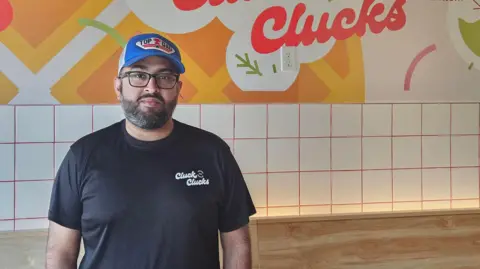Enterprise reporter
 Studying Sources
Studying SourcesA 90-day pause on Donald Trump’s sweeping tariffs plan is about to run out on Wednesday, which may upend US buying and selling relationships with the remainder of the world. However the uncertainty of the previous few months has already pressured a number of firms to rethink their provide strains in radical methods.
When an Illinois toymaker heard that Trump was introducing tariffs on Chinese language imports, he was so incensed that he determined to sue the US authorities.
“I am inclined to face up when my firm is in real peril,” says Rick Woldenberg, who’s the CEO of instructional toy agency Studying Sources.
Nearly all of his firm’s merchandise are made in China, so the tariffs, which US importers must pay, not Chinese language exporters, are actually costing him a fortune.
He says his import taxes invoice leapt from round $2.5m (£1.5m) a yr to greater than $100m in April when Trump quickly elevated tariffs on Chinese language imports to 145%. That might have “devastated” the corporate, he says.
“This type of influence on my enterprise is just a bit bit arduous to wrap my thoughts round,” he says.
With US tariffs on Chinese language imports now at 30%, that is nonetheless unaffordable for a lot of American firms reminiscent of Studying Sources.
So along with its persevering with authorized battle, it’s altering its world provide chain, shifting manufacturing from China to Vietnam and India.
These two international locations, like most others around the globe, have seen the US hit them with normal 10% tariffs, two-thirds decrease than these on China. Though these 10% tariffs are as a consequence of run out on Wednesday, 9 July, uncertainly stays over what they could get replaced by.
In the meantime, many Canadian firms, who usually commerce in each their residence nation and within the US, are actually going through a double hit to their provide chains.
These hits are the 25% tariffs put in place by Trump on many Canadian imports, and the reciprocal ones of the identical stage that Canada has positioned on a number of American exports.
And different companies around the globe are exporting much less to the US, as a result of their American import companions are having to place up costs to cowl the tariffs they now must pay, which makes their merchandise costlier on US cabinets.
At Studying Sources, Mr Woldenberg has now moved about 16% of producing to Vietnam and India. “Now we have gone by means of the method of vetting the brand new factories, coaching them on what we would have liked, ensuring that issues may circulation simply, and growing relationships.”
But he admits that there are uncertainties: “We do not know if they will deal with the capability of our enterprise. A lot much less the entire world shifting in there on the identical time.”
He additionally factors out that switching manufacturing to a different nation is pricey to organise.
Within the meantime, his authorized case towards the US tariffs, referred to as “Studying Sources et al v Donald Trump et al” is continuous its means by means of the US court docket system.
In Might a decide on the US District Court docket in Washington DC dominated that the tariffs towards it were unlawful. However the US authorities instantly appealed, and Studying Sources nonetheless has to pay the tariffs in the intervening time.
So the agency is continuous to maneuver manufacturing away from China.
 Studying Sources
Studying SourcesInternational provide chain professional Les Model says that it’s each costly and tough for firms to change manufacturing to totally different international locations.
“Looking for new sources for important elements of no matter you’re doing – that is loads of analysis,” says Mr Model, who’s CEO of advisory agency Provide Chain Logistics.
“There’s loads of high quality testing to do it proper. It’s a must to spend the time, and that actually takes away from the enterprise focus.”
He provides: “The information switch to coach a complete new bunch of individuals on find out how to make your product takes loads of money and time. And that results already razor-thin margins companies have proper now.”
For Canadian fried hen chain Cluck Clucks, its provide chain has been considerably impacted by Canada’s revenge tariffs on US imports. It’s because whereas its hen is Canadian, it imports each specialist catering fridges and strain fryers from the US.
Whereas it could possibly’t dwell with out the fridges, it has determined to cease shopping for any extra of the fryers. But with no Canadian firm making different ones, it’s having to restrict its menus at its new shops.
It’s because it wants these strain fryers to prepare dinner its bone-in hen items. The brand new shops will as an alternative solely have the ability to promote boneless hen, as that’s cooked otherwise.
“This was a considerable determination for us, however we imagine it is the precise strategic transfer,” says Raza Hashim, Cluck Clucks CEO.
“It is vital to notice that we do plan to retain the mandatory kitchen area in new areas to reintroduce these fryers ought to the tariff uncertainty be utterly resolved sooner or later.”
He additionally warns that with the US fridges now costlier for the corporate to purchase, the value it prices for its meals will probably must go up. “There’s a certain quantity of prices we can not take in as manufacturers, and we might must move these on to shoppers. And that isn’t one thing we need to do.”
Mr Hashim provides that the enterprise is continuous with its US enlargement plans, and it has arrange native provide chains to supply American hen. It at present has one US outlet, in Houston, Texas.
 Cluck Clucks
Cluck ClucksIn Spain, olive oil producer Oro del Desierto at present exports 8% of its manufacturing to the US. It says that the US tariffs on European imports, presently 10%, are having to be handed on to American customers. “These tariffs will immediately influence the top shopper [in the US],” says Rafael Alonso Barrau, the agency’s export supervisor.
The corporate additionally says it’s doubtlessly decreasing the amount it sends to the US, if the tariffs make buying and selling there much less worthwhile, and exporting extra to different international locations as an alternative.
“We do produce other markets the place we are able to promote the product,” says Mr Barrau. “We promote in one other 33 markets, and with all of them, and our native market, we may cushion US losses.”
Mr Model says that companies around the globe would have been much less impacted if Trump had moved extra slowly together with his tariffs. “The pace and velocity of those choices are actually making all the things worse. President Trump ought to have gone slower and been extra significant about these tariffs.”
Again in Illinois, Mr Woldenberg can also be involved about the place Trump will go subsequent in his commerce battles.
“We simply must make the very best determination we are able to, based mostly on the data we’ve, after which see what occurs,” he says.
“I do not need to say ‘hope for the very best’, as a result of I do not imagine that hope is a method.”
